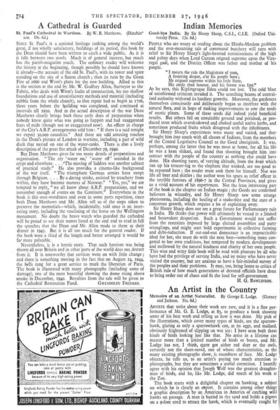Good-bye India. By Sir Henry Sharp, C.S.I., C.I.E. (Oxford Uni-
versity Press. 12s. 6d.)
PEOPLE who are weary of reading about the Hindu-Moslem problem and the ever-mounting tale of communal butchery will turn with relief to Sir Henry Sharp's light-hearted reminiscences of the high and palmy days when Lord Curzon reigned supreme upon the Vice- regal gadi, and the District Officer was father and mother of his people.
"I mourn the rule the Magistrate of yore, A fostering despot, o'er his people bore ; He reigned supreme within his little State, His smile shed honour, and his frown was fate." As he says, this Kiplingesque Eden could not last. The cold blast of uninformed criticism invaded it. The scorching beams of central- ised authority withered its hardiest growths. Moreover, the gardeners themselves consciously and deliberately began to interfere with the natural flora, and in hope of making improvements to sow the seeds of exotic plants: Some of these seeds did indeed yield beneficial results. But others fell on unsuitable ground and perished, or pro- duced trees which overshadowed and choked useful native herbs, and sometimes produced fruits which disagreed with the inhabitants.
Sir Henry Sharp's experiences were many and varied, and they brought him into touch with all classes of Indians, from the members of the Central Legislative Council to the Gord aboriginals. It was, perhaps, among the latter that he was most at home, for all his life he was a keen shikari, and found that shooting brought him into contact with the people of the country as nothing else could have done. His shooting yarns, of varying altitude, from the krait which ran up his trouser-leg to the elephant that winked, are too good to be repeated here ; the reader must seek them for himself. Nor was life all beer and skittles ; the author won his spurs as relief officer in the terrible famines of 1896-7 in the Central Provinces, and gives us a vivid account of his experiences. Not the least interesting part of the book is the chapter on Indian magic ; the Gords are confirmed believers in wizardry, and Sir Henry Sharp saw some strange phenomena, including the healing of a snake-bite and the cure of a cancerous growth, which require a lot of explaining away.
Sir Henry Sharp does not see a great future for Parliamentary rule in India. He thinks that power will ultimately be vested in a limited and benevolent despotism. Such a Government would not suffer from the restraints imposed by large elected assemblies and party wranglings, and might start bold experiments in collective farming and debt-reduction. If out-and-out democracy is an impracticable ideal for her, she must do with the next best—something more con- genial to her own traditions, but tempered by modern developments and mellowed by the natural kindness and charity of her own people. This wise and witty little book will be read with pleasure by all who have had the privilege of serving India, and by many who have never visited the country, but are anxious to have a fair-minded survey of the peoples and their problems. It may, too, bring home to critics of British rule of how much generations of devoted officials have done to bring order out of chaos and fit the land for self-government.
H. G. RAWLINSON.






























 Previous page
Previous page